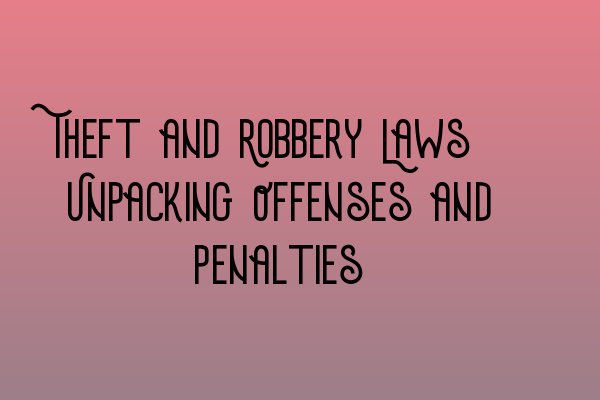Theft and Robbery Laws: Unpacking Offenses and Penalties
In the realm of criminal law, theft and robbery are two distinct offenses that carry severe penalties. As a solicitor at SQE Criminal Law & Practice Law UK, I aim to shed light on these offenses, their differences, and the consequences they entail. Understanding these laws is crucial not only for legal professionals but also for the general public.
Theft: Taking Someone’s Property Unlawfully
Theft, as defined under UK law, involves the act of dishonestly appropriating property belonging to another individual without their consent. Whether it’s shoplifting, pickpocketing, or burglary, theft encompasses a wide range of actions that aim to deprive someone of their rightful belongings.
It’s important to note that dishonesty is a key element in theft cases. The courts will assess whether the defendant acted dishonestly, taking into account the commonly held standards of honesty.
Penalties for theft can vary depending on the specific circumstances of the case. Factors such as the value of the stolen property, the defendant’s previous criminal record, and the level of planning or organization involved will influence the severity of the punishment.
If you want to delve deeper into the nuances of theft law or prepare for the SQE 1 examination, SQE 1 Practice Exam Questions would be a valuable resource to test your knowledge.
Robbery: Theft with Force or Threat
While theft involves dishonestly appropriating property, robbery takes it a step further by incorporating force or the threat of force. For an act to be classified as robbery, the defendant must use force, or the fear of force, to steal someone’s property.
Robbery is considered a more serious offense compared to theft due to the physical and psychological harm it inflicts on the victim. The law views the use of force or the threat of force as an aggravating factor, warranting harsher penalties.
Similar to theft, the severity of the punishment for robbery depends on various factors. These include the level of violence used, the value of the stolen property, and whether any weapons were involved.
If you’re interested in enhancing your understanding of robbery laws in preparation for the SQE 2 examination, the SQE 2 Preparation Courses can provide you with the knowledge and guidance you need.
Penalties for Theft and Robbery
The penalties for theft and robbery can range from fines to imprisonment depending on the seriousness of the offense. The court will consider the circumstances of the case, the defendant’s involvement, and any aggravating or mitigating factors when determining the appropriate punishment.
In the case of theft, the maximum custodial sentence can vary. Minor instances of theft may result in community service or a fine, while more serious offenses can lead to imprisonment for several years.
Robbery, on the other hand, carries much more severe penalties due to the additional element of violence. Convictions for robbery can result in lengthy prison sentences, especially in cases where weapons were used or significant harm was inflicted on the victim.
To stay up to date with the latest SRA SQE Exam Dates and other relevant information related to SQE preparation, SQE 1 Preparation Courses would be a valuable resource for aspiring solicitors.
Conclusion
Theft and robbery laws play a crucial role in maintaining the integrity of our society. Understanding the distinctions between these offenses is vital for legal professionals and anyone seeking to expand their knowledge in criminal law.
By exploring resources such as the SQE 1 Practice Mocks FLK1 FLK2, SQE 2 Preparation Courses, and the SQE 1 Preparation Courses, you can further enhance your comprehension of these complex criminal offenses and ensure you are well-prepared for any legal challenges that may arise.
If you have any questions or legal inquiries regarding theft, robbery, or any other criminal law matters, don’t hesitate to contact us at SQE Criminal Law & Practice Law UK. Our expert team is here to assist you.
Disclaimer: This blog post is intended for informational purposes only and should not be taken as legal advice. Always consult with a qualified solicitor for specific legal concerns.
